
lesson 4 || to be human
This is dedicated to ItsRainingEndlessly :) Thanks for requesting, haha :)
This was actually a difficult lesson to construct, because I wanted to make sure I said everything that needed to be said. Hopefully, the stuff below is informative and it's long. But, my dear precious readers, I want to share all of this knowledge so that we could start reshaping the anime fandom in Wattpad. I have friends, and some of them say Wattpad is shitty because there's no actual story in many fanfics. Let's start changing that shall we? Because I've seen a few fanfics and they're actually good. Though I'm not much of a reader now, but I really want Wattpad to be a good community library.
I hope you all feel the same.
Lesson 4 || To Be Human
Characters are an essential part in storywriting. If anything else, they are the drive of the story, they are the apple to the eyes of the readers. Because as we all know it, the characters are the ones that make the story happen. The story revolves around them. But even if we get the gist that it's going to be a great story but we know that the characters are horrible, chances are: the readers won't even bother.
As we all know, we, them humans who are wasting on dear Mother Earth, are far from perfect. And in stories, there's always the good characters and the bad characters. There are the protagonists and the antagonists, and there are the heroes and the villains. The four mentioned terms are not the same, just so you guys know. I'll be delving into both protagonist and hero; and also into antagonist and villain while discussing what makes them compelling and relatable.
The protagonist of the story only means that whoever this is would be the main character of the story. He/She would not necessarily mean they are the good or just people of the story. The story merely revolves around them. The same goes for the antagonist. The antagonist is simply the person fighting against the protagonist, or taken from its Greek origin--the one who initiates change. Now the antagonist/villain is the one who sets the story in motion, not the protagonist/hero. In that sense, the villains act, the heroes react.
The hero is the one who is admired for his good deeds and courage plus whatever there is noble, even though he isn't always morally right--the anti-hero. Then there is also the villain--the great evil in the story, who is the person the hero is supposed to vanquish and defeat.
The traits between the protagonist and the hero is that they both are the ones whose perspective we view the story from and that they are the driving motivator of the story. The trait the hero has that the protagonist does not is that the hero has a pursuit of a personal goal, in other words they have a quest which they much accomplish.
To make things clearer, let's compare Kousei from Your Lie in April and Deku from Boku no Hero Academia.
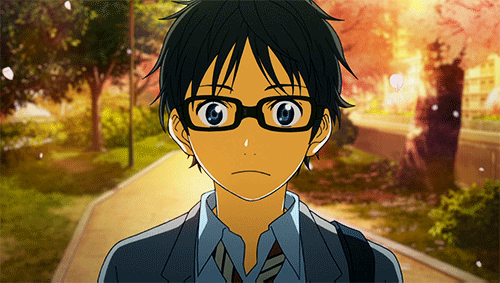
Kousei is the protagonist of Your Lie In April because, yeah, he's the main character and the story revolves around him and his journey through the story with his friends, primarily Kaori.
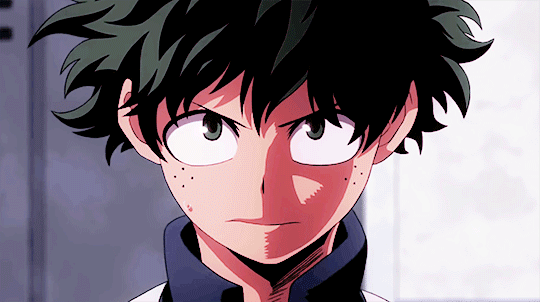
Deku is also the protagonist of Boku no Hero Academia, but he's the hero of the story because he is in pursuit of a personal yet noble goal: become a greater hero than his idol, All Might.
I learned this from a video I saw as I researched to improve this lesson is that we can now divide the whole nebulous term of "hero" into two scales:
> the Relatable/Powerful Scale
> the Amoral/Virtuous Scale
In the relatable side of the Relatable/Powerful Scale, the heroes would be those who are more human, and more or less, they have abilities that are closer to those who are average. So they are basically the heroes who were "losers to heroes" simply put. We see those characters in anime all the time. They are the ones who struggled to become stronger with the drive to protect the people they love or to simply just become hunky chunks of meat. Though they may have some character traits that make them powerful, they are still essentially still at the mercy around them. They are not invincible as to the characters who are way more powerful than they are who can be considered as invincible. Examples would include Deku, Gon, Eren, and even Kaneki Ken from Tokyo Ghoul.
Then in the Powerful side of the Relatable/Powerful Scale, the heroes are those who resemble the characters in Greek mythology wherein they are already gifted with a lot of power from the very beginning of the story. They are the god-like characters in the story that have the ability to drastically affect the world around them. But this is contextual to the story you are writing. In the supernatural world, god-like characters could include Saitama, All Might, Levi, and Goku.
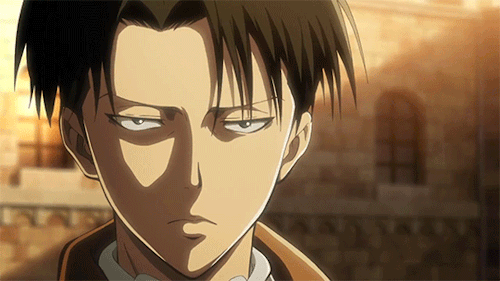
If you put god-like characters in a smaller scale, you could look at the prodigies in Kuroko no Basket. They do not belong to the supernatural world, but in basketball they are considered god-like because of their beyond-average human abilities. If you compare Kuroko and Goku through the context of their story, they both carry the same narrative weight because they are able to really influence the environment around them in the story. But if you put Saitama in a world where everyone has the same abilities as his own, then he isn't someone so special anymore. He would be considered normal.
Moving on to the Amoral/Virtuous Scale, we could understand that in the Virtuous Scale, the characters are those who are considered heroes of justice and peace--those who carry the traits of bravery and courage to do what is ideally right. While in the amoral side of the scale, we have heroes whose morals are seen as questionable.
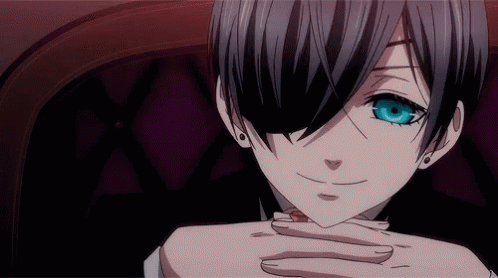
They are those who do not let conventional morality influence or get in the way of their goals, which could include hurting or killing people who are in their way. So, you could put in Guts, Kaneki Ken, Revy from Black Lagoon, Alucard from Hellsing, and even Ciel.
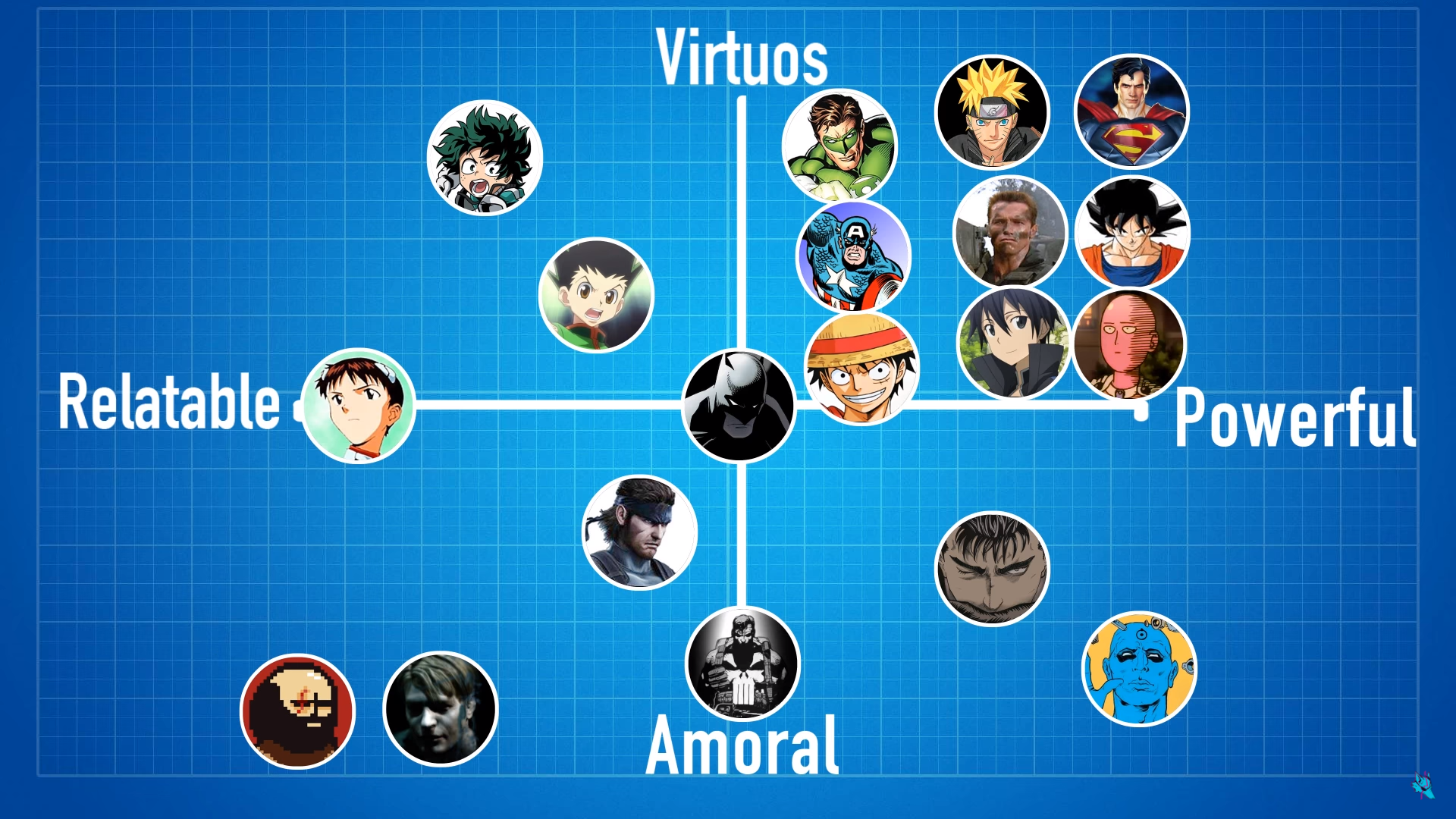
Combining the two scales, we could see that it creates a graph where we could see what kind of hero. On the top right, we could see the example of the classical definition of a benevolent, guiding demigod as quoted in the video. Then across Superman, we could see the example of the morally ambiguous mess of a human being. Looking at the graph, we could see that the heroes we often see actually belong to the top right. This means that the characters we (not us technically) write are very similar heroes.
Although they are simply heroes who we idealize them as, instead of writing of how they actually are. And seeing them often has made their appearance somewhat stagnant. And because we cannot relate to them so much, we actually appreciate the villains more compared to the heroes.
The reasons why writers often write those kinds of heroes is because it follows a certain pattern which was popularized by Star Wars. It follows the pattern of the "Hero's Journey" which follows this chronological pattern of events:
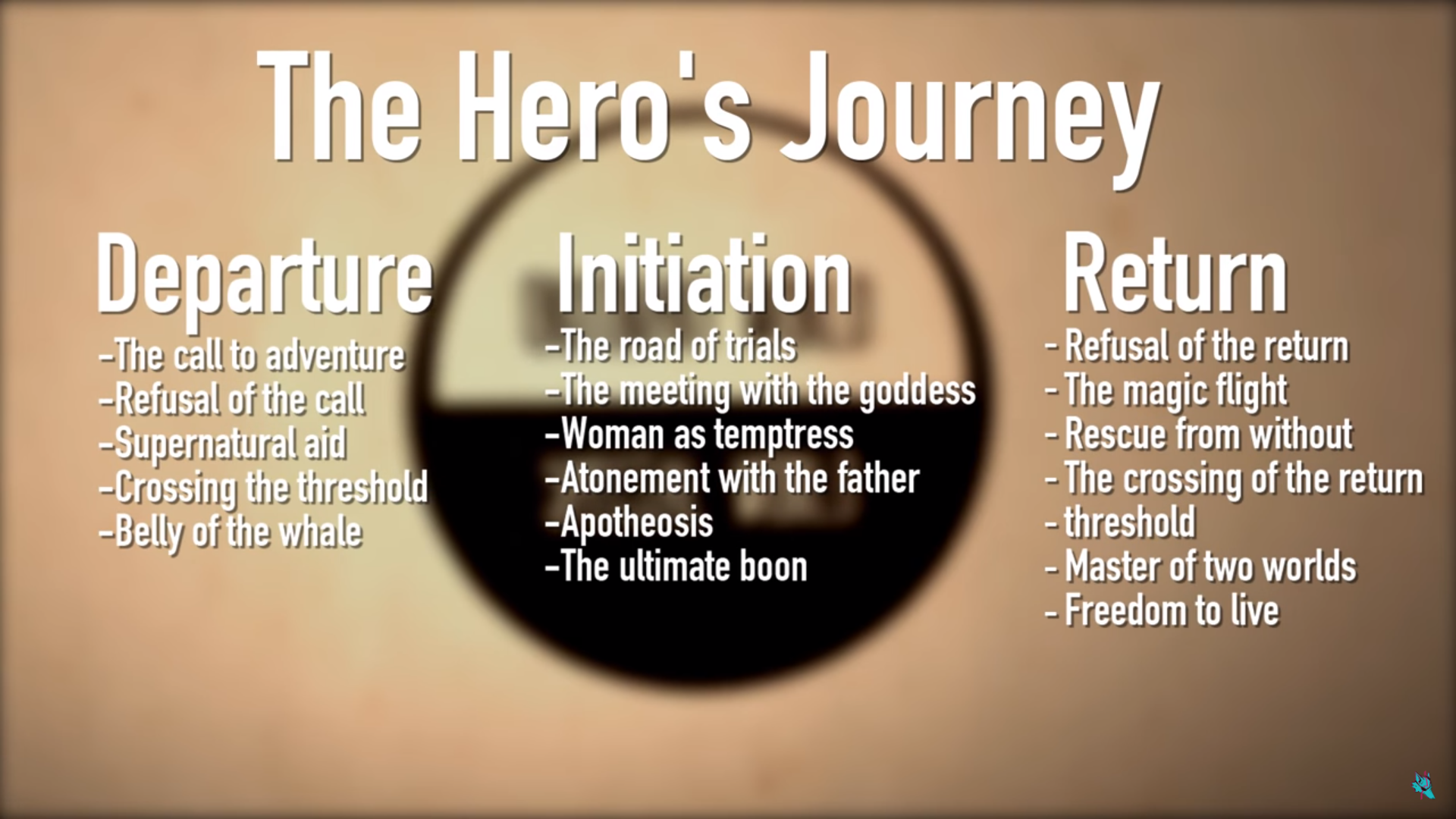
The major three steps: departure, initiation, and return is more or less the pattern which is popularized by Star Wars, although many "adventure quests" anime follow the three. I wanted to research more, but this lesson is supposed to teach you guys how to make relatable characters, so we'll move on from that. But if you're interested, just search up "The Hero's Journey" for more info. Although basically the hero's journey starts with the hero being called to some quests, he obtains some great power, vanquishes the great evil, and then with that great power they have obtained the hero shares this power to create peace and whatever there is to be noble about.
But this hero's journey isn't actually a guide. It was just an observation of how hero's stories go back then. Despite that, many stories nowadays either partially follow it or are influenced by it. The downsider here though is that the hero's journey only necessitates a certain type of hero. Like he is either already a prodigy of some sort or he has the potential to be one. He is the type of hero who is very much powerful in the end with a virtuous moral character. So in the end of all this, the hero's journey created the memeification of the mordern-day hero--good guys because they do good things who will inevitably have to defeat their nemesis who are their parallel opposites because they are the opposite of them--the bad guys.
Although they are good fantasies to oggle about, the heroes don't feel like actual people because they are close to perfect. But not to worry, there is the graph I got from the video, which was just very helpful and useful.
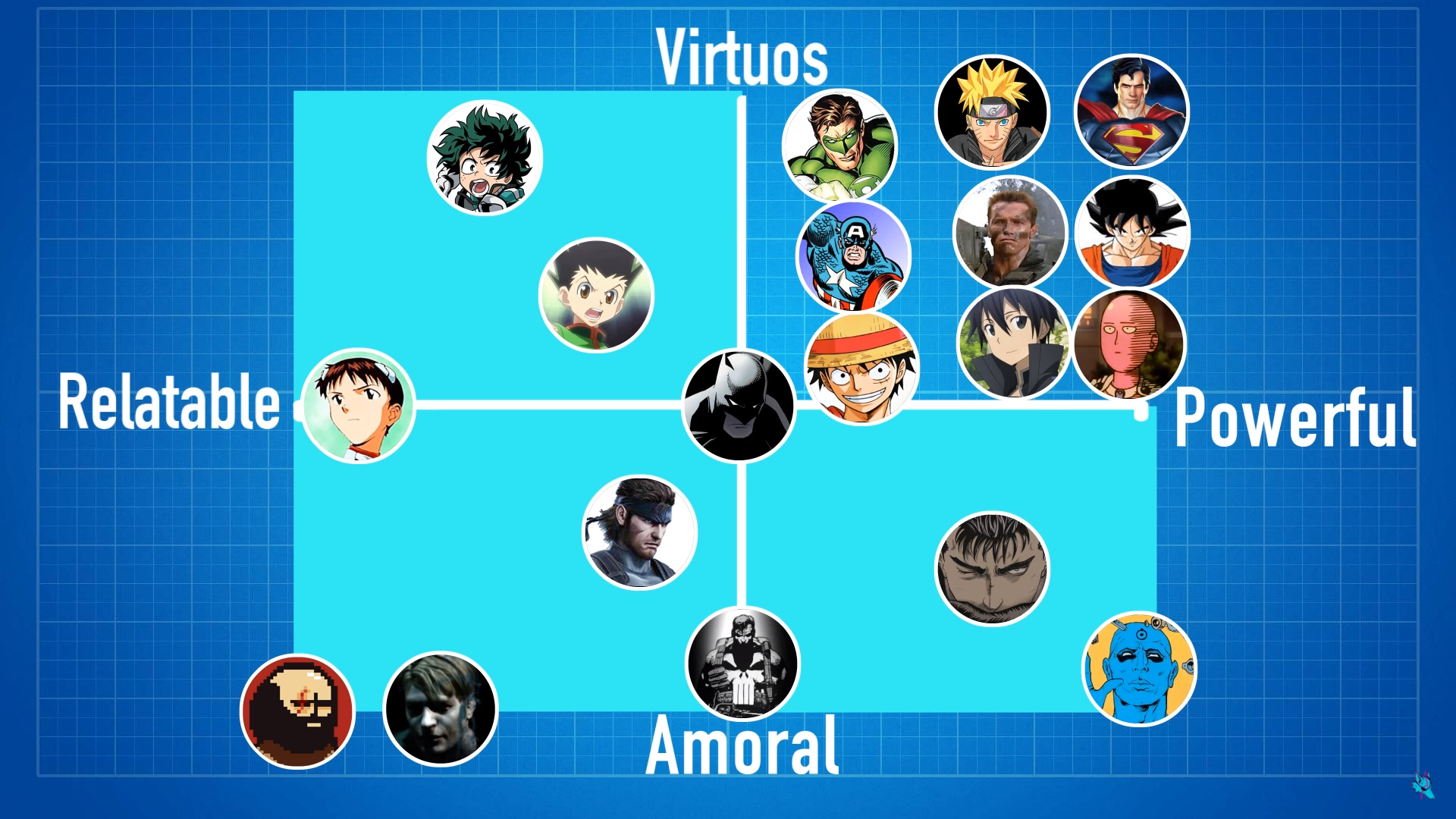
If we move our hero types away from the Powerful+Virtuous traits, we get more variations for heroes. We could even say "more realistic" because we know that humans are far from invincible, and even their own ideals and morals can be swayed. Even if they have great strength and physical prowess, they like us know that they cannot always solve their problems through sheer force, or we could also say that they cannot do what they want because of what their ideals are. There will always be people who are in a better position than they are, and there are just some things that they cannot control. They only have a little capacity to control the forces around them. So when they actually change their initial fate (let's say death and destruction), it becomes more significant in its impact towards us readers, but it also lets us know that they are more like regular people instead of gods.
Another way of diversing the hero archetype would be giving the heroes a flaw, which i would be diving more into in a bit. A flaw in heroes can also be one of the most misunderstood in the universe of the characters. In our perspective, we would just be those merciful, empathetic, or benevolent observers so we could understand what a hero is going through while he is being criticized for his amorality. We see everything that he or she is going through and we create an understanding of why he or she is turning out. From a god-like perspective, we see flaws as a way to make the story more dramatic or even a reason why the story began because through the story, we see that hero making up for that flaw.
And so the hero's capacity to do good will be greatly altered by his concept of good, which would make things very much interesting.
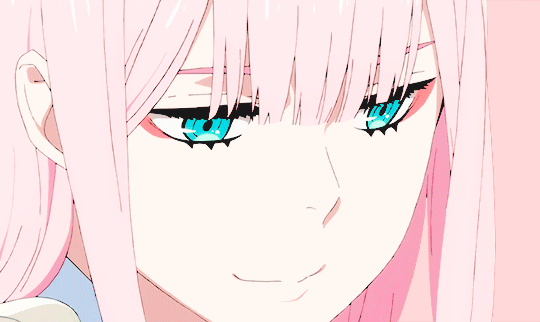
In Darling in the FRANXX (I'M SORRY IF I SPOIL ANYONE HERE), we could see Zero Two trying so hard to kill the monsters for some reason that at her own teammates see her as an uncontrollable monster, while in her opinion it was the only way to truly have the right to earn Hiro's love. There could even be some cases of heroes deciding to kill of some people in order to protect someone else. Let's make Mikasa our example here.
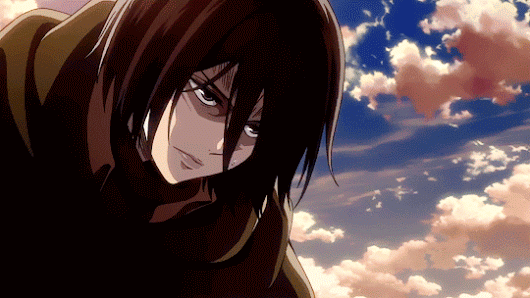
Mikasa, as we all know, is deeply in love with Eren. She would kill anyone, even her own friends (or maybe she never considered them to be) like Reiner and Bertholdt, without hesitation if they are by any means a threat to the one she cares for, which we all know is Eren. To us, she is a hero, but to the people in her universe, she is a beast who pampers Eren.
A good example would be the villain from Hero Academia, Stain. He's obsessed with the "selfless, virtuous" hero ideology that whoever does not exceed that requirement immediately is seen as a villain in his eyes. To him, he is being a hero because his mission is to purge the world of his ideology of removing heroes who are not as noble as Deku and All Might by far. But to everyone else, he's a nutcase with bloodhound instincts.
But the good thing is, whatever he is pursuing results in a dramatic reduction in crime. Whatever city he operates in becomes more peaceful and lower crime rates. And though he leaves a messy trail behind, his work could actually result with more lives being saved.
Putting all that heroism aside, flaws and imperfections are what makes characters in general more relatable. The things they struggle with allows us to empathize with their pains, insecurities, and even heartbreak. One of the most compelling characters I have ever come across are Decim from Death Parade and Violet from Violet Evergarden. Both of these characters are known to lack the abilities to show emotions, and though they developed the understanding of the world and the people in a different pace they both realized how people actually feel.
Decim learned that judging people at their worst is not the most efficient way to decide whether they get reincarnated or get thrown into oblivion. Being with Chiyuki made him realize that people can experience a lot of pain--both physical and emotional. Some people learn to accept their fate while others refuse to accept that death is right in front of their face, thinking that they still have a continuation to their previous life--only to realize later on that they are actually dead. And maybe just an inkling, he learns what love can be and what attachment felt.
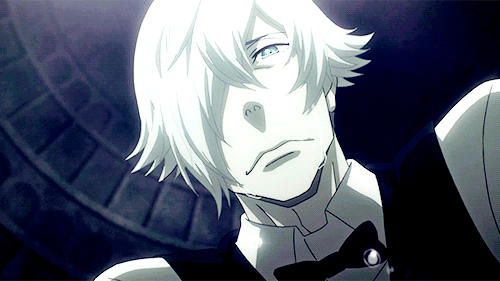
Through the anime he would actually start trying to understand his human assistant, Chiyuki who often expressed her disapproval of the system in judging people. Being inhuman as he is an arbiter in the afterlife, Decim actually tries to be as caring as possible and even more so after meeting Chiyuki. At the end of it all, he finally felt more than just sympathizing with the humans he encounters, but even felt their pain. Honestly, I ship Decim and Chiyuki to the max.
In my opinion, being a very empathetic person, I find war stories most tragic because this is where life and death is 50/50. Entering into the world of Violet Evergarden, the heroine is introduced as a soldier who had just survived war.
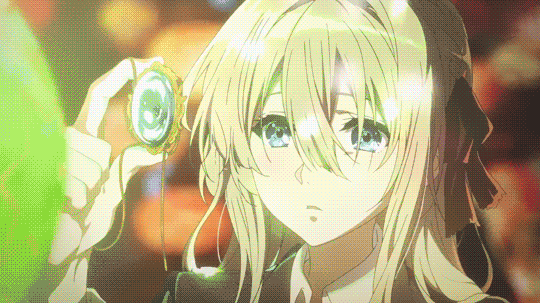
She has little knowledge about emotions and feelings because she herself fails to comprehend the natural. It is never explained what happened to her to make her this way, but we get the idea that she is very loyal to her superior whom she calls as 'Major.'
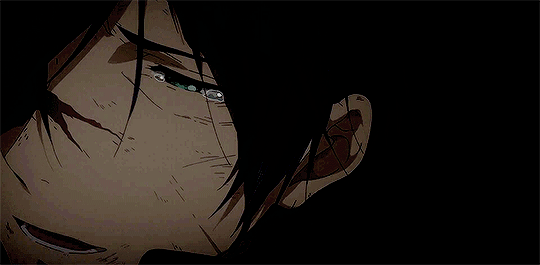
Through the anime she meets various kinds of people as she tries to learn human emotions. Because during her last meet with the major, he tells her something she failed to understand. Though they speak the same language, Violet gets the idea that her superior uttered something deep and meaningful, but she fails to understand the meaning of it. As days would go by with her work as a ghost writer, Violet learns human emotions and even learns to understand and feel--very much to the point that she would be brought to tears just witnessing a dramatic scenario.
Heroes, in their own personal way, should always have some kind of flaw--whether it's physical or moral. It allows them to grow through the story, and we get to see them overcome many kinds of obstacles that come their way. Maybe sometimes they don't overcome the obstacle and they fail. But that's okay. Everyone makes mistakes and not everyone gets to overcome the obstacles in their path. It makes them all the more human.
Let's take Yoshie from The Mourning Samurai from my personal works. She's distrustful of people, and even if she first came to Konoha to ask for help she backed out in the last minute. So even if Naruto and the rest finally decided to help her, she refuses their help then because of something and that is yet to be revealed. I write characters and make sure that they aren't perfect. They may seem perfect, but as we go on with the story we see more and more of those flaws the character needs to deal with or needs to come up with something to make up for that flaw. But sometimes flaws are what makes the character unique and special. Some "flaws" may be small, but they can actually be a big impact on the rest of the characters. It also adds to their personality.
Let's move on to villains.
Now the thing about villains in anime is that they can be two things: a story device or an actual character. I watched a video about making good villains, and as I finished the video it all made sense to me. As we all know and maybe sometimes relate to, is this urge that sometimes we feel bias for the antagonist over the character. I felt this way in Durarara!! and Hunter x Hunter because I don't know, I love Izaya and Hisoka and they're just pretty badass. But what makes a good antagonist/villain?
Often in stories, the antagonist/villain is usually just an object the protagonist/hero is supposed to overcome or a force to defeat. But if we keep that in mind, we lose the potential in making such a great villain. Often times we forget that these people are human, too.
That's why there is a thing called plot twists and there is also character development. Sometimes we may look into an action series with a series of murders and we wouldn't even know that the best friend actually happens to be the villain the hero is chasing after all along. So the villain actually being close to the hero makes us create this subtle attachment to the character because we learned to sympathize with the character. Good villains are those that actually can be normal humans, only that they have a loose screw somewhere in their head. It's like Johan Liebert from Monster who is crazy for some reason. He's handsome and all, he could've just lived normally if he didn't go around killing people while he was a kid.
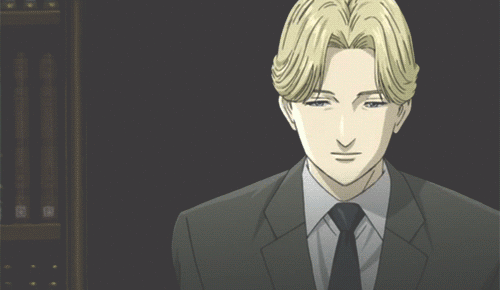
Remember, there is only a thin line between a villain and a hero, and that is either a very bad day so the bad guy is in a tantrum or the fact that the bad guy made a lot of wrong decisions in his or her life. The simple idea that people are cut out from the same cloth and so they go through the same daily trials and hardships is so deep, but the characters all the same make different decisions. Some people make good ones, some poor. Or we could put it in the way writer Ben Bova puts it:
❝In the real world, there are no villains. No one actually sets out to do evil. There are no villains cackling and rubbing their hands in glee as they contemplate their evil deeds. There are only people with problems, struggling to solve them.❞
Taking Naruto for example, most of the villains ever shown were magnificent and incredible that even their own deaths brought me to tears. Their characters are just so compelling because they were all blinded by anger and hunger for revenge that if you put them in a scenario where they actually just moved on, they could have been a lot more happy and they could have found love or found some real purpose in life where they help other people.
It's like Obito, for example. If he just didn't empathize with Madara's beliefs and just waited for himself to get healed up, he could've been able to become a legendary ninja just like Kakashi or even better, or the fact that if he did not get swayed from his belief of being a noble ninja then things could have ended better for him. These facts make Naruto and Naruto Shippuden so much deeper and heart-wrenching, and honestly life could've been happier and easier for everybody if everyone was just more forgiving. Casualties could have been avoided, and there could have been more heroes. If you actually feel this kind of empathy, then you know exactly how I feel.
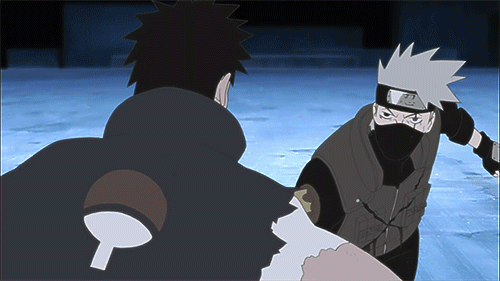
Actually, what I've noticed in anime is that villains actually tend to be very similar: a lot can actually have long hair, lol, or they are perverted psychopaths with no real goal whatsoever, or they are radicals with a goal to shape the world into what they believe the world should be, or they want to get back at the world, or they just live through life with an incredible level of disregard and apathy to the rest of the world, or just a product of a catharsis of their ultimate downfall where their ideals are turned backwards.
If you look at anime carefully, the villains tend to be a lot more interesting than their "heroic" counterparts. There is a lot more to them because we get to discover their backstory and realize the reason why they turned out to be psychos. They are the ones who feels so strongly about a belief or ideology that they are willing to throw everything else aside just to realize that dream or purpose, enough that they would set themselves outside the bounds of society and the law to create a change in the world they live in.
Let's take Stain from Boku no Hero Academia. I've mentioned him earlier on in the chapter, but let's talk about him more. I have not read the manga, but from what I could learn from the anime is that he is most probably a hero. Or should I say was. It may seem that Stain had developed some kind of major grudge against the hero society that as I have mentioned before, if heroes didn't fit into his standard for hero, they could actually die by his blade.
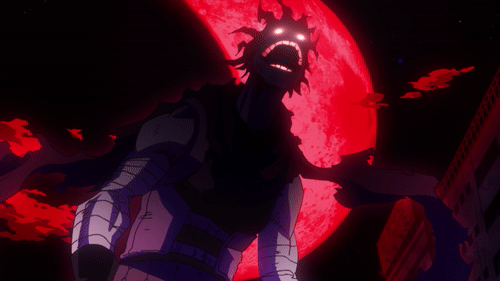
He's a villain in the anime and manga, but his ideal wasn't actually entirely bad. I guess he didn't like it that heroes have become some sort of job people would pursue just because they have the quirks to do so. It has led a lot of people to want to be on the top, rather than be the selfless, virtuous hero they should be to save others. After all, some people only wanted to become a hero to earn money, or because it's a family tradition, or just so they can beat someone in a personal contest. Becoming a hero had become a lifestyle and it has stained the image of the actual hero. Only Deku, by far, became a hero because he wanted to save people with a smile just like All Might. And because of this, Deku earned Stain's respect.
This kind of ideology is actually common in anime. I've seen a lot of villains in anime, and a lot of them actually became villains because they try to purify the world of evil and crime. And through the process of realizing this ideology, the characters become the villains in the hero's and civilians' perspective. Some villains do what they do to get back at the world, like Altaire from Re:Creators. Her creator killed herself because there was no one to be her support, and it's not like Altaire would have been able to help because she manifested after her creator's death. Her terrorist attacks were meant to get back at the world who killed her owner.
So, we have villains with backgrounds that make us empathize with their personal goals. Sometimes as we get to know them, we realize that sometimes the villains are right, and they just do stuff because no one else has the balls to do so or because it's unlawful to do so. They are the ones with balls to change the world, but sometimes their plans are just plain crazy and it involves getting billions of people killed. Heroes would not allow that to happen.
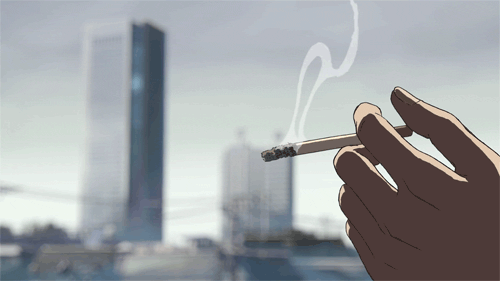
Everyone has personal problems, everyone has flaws, and everyone has a reason to the kind of person they are. The key to making characters more relatable, human, or compelling is to make flaws, weaknesses, and give those characters fears. Of course, we give those characters hopes and dreams, but without the first given three we won't make so much of compelling and unforgettable characters. If we showcase those things early on, you will be able to earn the sympathy and sometimes even empathy towards the characters. Putting this up early on also sets the readers to fear that the characters might trip over themselves because of those flaws, which they may or may not be aware of.
Those flaws that we speak of, may or may not be the strength of another, but this makes the characters make more of an impact. The further the characters try to hide their flaws, the greater we hope and fear for those characters. It would be like those characters who lie to others and even sometimes lie to themselves about their own identity and we fear for them if the truth is ever brought to light.
Sometimes the audience develops a bias for the characters, and they immediately remove all thoughts of that character ever making mistakes. But if you remove that character bias, you make the character more real and human. There are things the audience finds more enjoyable and one of them would be seeing ordinary characters get thrown into extraordinary circumstances, and seeing them act bravely to overcome those circumstances gives a big impact, most especially when we see them actually winning the battle.
Internal battles within a character creates an personal conflict. There could be the outside battle which could be the forces that forces the character back into a corner but that's just the physical--it's not like the character would be questioning his own existence because of that. Well, most of the time. But with their fears and insecurities, we get to see the character who is outstandingly brave become the frail child he or she can be. We could see them worry and cry over something that somehow sways their morals and ideals.
The thing is, the protagonist isn't supposed to be perfect. He or she may be good generally, but they could have bad flaws like a bad temper or they could be selfish. They cannot be 100% good. It could also go the same for an antagonist--he or she could be a bad bully but has a love for animals. Seeing characters in their bad and good is what makes them more relatable. No one is perfect, and the same should go for the characters in a book.
My last example among my books would be Akari from Terror In Resonance. She may seem all good and cool, but she has her own personal conflicts, fears, and insecurities. There's a scene where she's nearly killed by the brothers because of their obsession for Yui, but later on she just forgives them. Though it's a spoiler but it's not like some of you read Diabolik Lovers fanfics anyway. The reason why she forgave them is because she's a clingy person. She keeps losing people she cares for under various kinds of circumstances so when she met them and began to live under the same roof as the rest of them are, Akari developed an attachment towards them. They may be abusive and everything at first, but she would rather get hurt than be alone.
♦ ♦ ♦ ♦ ♦ ♦
I hope you found this helpful, please comment your thoughts, suggest ideas, and good luck on your writing!!!
//hugs
See you at the next chapter! And don't be scared to request lessons, or something.
Upcoming lessons:
> au's, cannons, and in-betweens
> jaw drops: plot twists
> how to keep the original characters from the anime from getting ooc
> etc.
FRIENDLY TIP:
Know your characters in and out. Don't write a story where you are not 100% sure about your OCs yet, because you might regret writing something as you write and it's not like you can just change it. So be sure about your characters.
Bạn đang đọc truyện trên: Truyen247.Pro